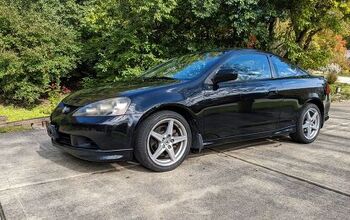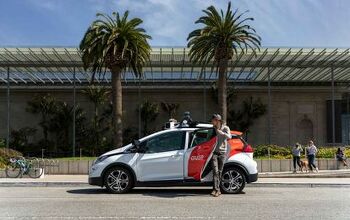Your Future No Longer Includes Rear-Ending That Other Car

As we reported yesterday, a group of top automakers has agreed to offer automatic emergency braking (AEB) on almost all of their models by 2022.
The National Highway Transportation Safety Administration (NHTSA) confirmed the voluntary agreement today, meaning virtually all light-duty cars and trucks sold in North America will adopt the safety feature by Sept. 1, 2022.
The group is made up of Audi, BMW, FCA US LLC, Ford, General Motors, Honda, Hyundai, Jaguar Land Rover, Kia, Maserati, Mazda, Mercedes-Benz, Mitsubishi Motors, Nissan, Porsche, Subaru, Tesla Motors Inc., Toyota, Volkswagen and Volvo Car USA.
“By proactively making emergency braking systems standard equipment on their vehicles, these 20 automakers will help prevent thousands of crashes and save lives,” said U.S. Transportation Secretary Anthony Foxx in a statement.
Imposing mandatory AEB through regulations would have taken an extra three years, the NHTSA estimates, during which time a total of 28,000 preventable crashes (resulting in 12,000 injuries) would occur. The NHTSA and the Insurance Institute for Highway Safety (IIHS) worked closely with the automakers to reach the agreement.
The vehicles that must comply by 2022 are cars and trucks with a gross vehicle weight of 8,500 pounds or less. Trucks with a GVW of 8,501 to 10,000 pounds will have to comply by Sept. 1, 2025.
Owning a vehicle with AEB might just save you money above and beyond the collisions the system will help you avoid.
“Deploying AEB on a wide scale will allow us to further evaluate the technology’s effectiveness and its impact on insurance losses, so that more insurers can explore offering discounts or lower premiums to consumers who choose AEB-equipped vehicles,” stated IIHS Board Chairman (and CEO of American Family Insurance) Jack Salzwedel.
Taking full advantage of the announcement, Volvo released a statement today reminding everyone that automatic braking has been standard on its full line of vehicles since 2014. Volvo claims the technology has reduced rear-end collisions by 41 percent and injures to occupants by 47 percent.
[Image: Mark Turnauckas/ Flickr]

More by Steph Willems
Latest Car Reviews
Read moreLatest Product Reviews
Read moreRecent Comments
- Kjhkjlhkjhkljh kljhjkhjklhkjh I'd rather they have the old sweep gauges, the hhuuggee left to right speedometer from the 40's and 50's where the needle went from lefty to right like in my 1969 Nova
- Buickman I like it!
- JMII Hyundai Santa Cruz, which doesn't do "truck" things as well as the Maverick does.How so? I see this repeated often with no reference to exactly what it does better.As a Santa Cruz owner the only things the Mav does better is price on lower trims and fuel economy with the hybrid. The Mav's bed is a bit bigger but only when the SC has the roll-top bed cover, without this they are the same size. The Mav has an off road package and a towing package the SC lacks but these are just some parts differences. And even with the tow package the Hyundai is rated to tow 1,000lbs more then the Ford. The SC now has XRT trim that beefs up the looks if your into the off-roader vibe. As both vehicles are soft-roaders neither are rock crawling just because of some extra bits Ford tacked on.I'm still loving my SC (at 9k in mileage). I don't see any advantages to the Ford when you are looking at the medium to top end trims of both vehicles. If you want to save money and gas then the Ford becomes the right choice. You will get a cheaper interior but many are fine with this, especially if don't like the all touch controls on the SC. However this has been changed in the '25 models in which buttons and knobs have returned.
- Analoggrotto I'd feel proper silly staring at an LCD pretending to be real gauges.
- Gray gm should hang their wimpy logo on a strip mall next to Saul Goodman's office.


































Comments
Join the conversation
This will more than likely go the Takata route, everyone will source from the cheapest third world source, drivers will tailgate and crash, and we'll have a massive recall. Why not just drive better?
I am just waiting for the unintended consequences. While an undoubtedly good idea, now well does is it going to work in practice ?? I know my 2015 Accord is constantly warning me to brake when I am passing cars or changing lanes or even closing on someone in a rapid manner. What is going to happen when I do this with one of these system active? What happens when every 3rd or 4th car has these systems and they all suddenly (and unpredictably) brake ? I can smell the lawyer commercials already.